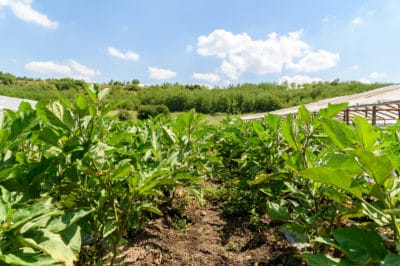Growing Season Conditions
For the most successful eggplant season, plant your seedlings in a garden or container that gets 6 hours of full sun every day. They also require well-drained soil that contains organic matter for extra nutrients. You can add organic manure, grass clippings or mulch to build up the nutrients in your soil.
Hardy Eggplant Varieties
If you want eggplants that produce fruit for the whole growing season, choose hardy cultivars. Most eggplants take from 70 to 120 days to reach maturity. The following eggplant varieties emerge early or midseason, extending the length of the season:
- Ichiban
- Little Fingers
- Black Beauty
- Ghostbuster
- Classic
Care and Maintenance
If you live in a cool climate, consider planting your eggplants in raised beds or containers that retain the heat in the soil. Spreading organic mulch over the soil also helps keep your eggplants warm, and keeps the soil moist. When you plant your seedlings, place them about 2 to 3 feet apart, in rows 3 to 4 feet apart.
Give your eggplant bushes a good soaking at least once per week throughout the growing season. The water should reach deeply into the soil, so the roots don’t become shallow.
Pests and Disease
Controlling pests and disease will extend your growing season, keeping the dramatic foliage and fruit healthy. If you notice any yellow leaves or damaged foliage, the culprit could be pests, such as flea beetles and aphids or diseases like verticillium wilt or mildew.
Pest Elimination
You can eliminate pests by using row covers to protect the foliage or plant trap crops that lure the pests away from the eggplants.
Verticillium Wilt
This is a fungal disease that infects eggplants. Once it enters your plants, there’s nothing you can do about it. If your plants are infected, pull them up, and discard them away from your garden.
You can then kill the fungus in the soil by a method called solarization. This heats up the top 6 inches of soil, killing the fungus. You can do this procedure by tilling the soil, and placing plastic over the soil for up to five weeks. After using this method, your soil will be disease free for the next growing season.
